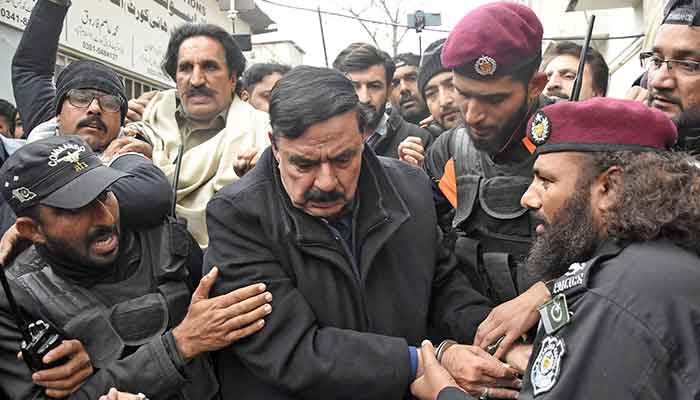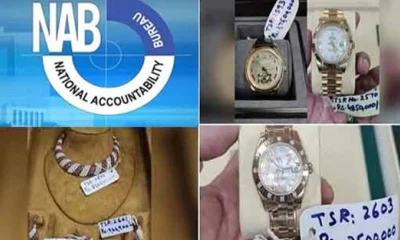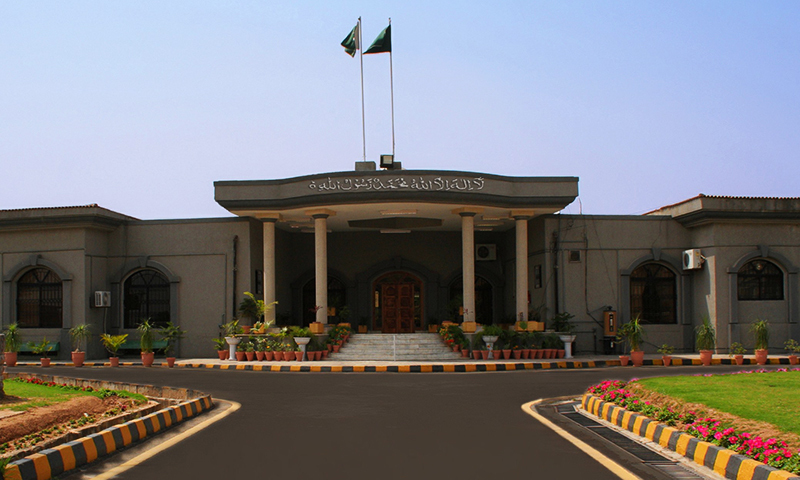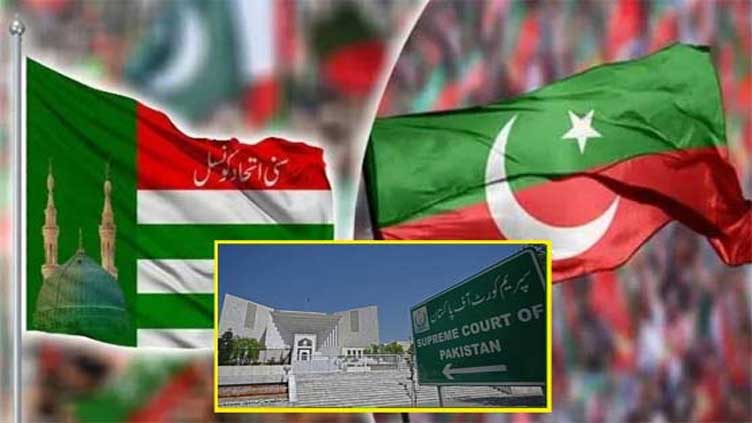- Court orders to ensure Sheikh Rashid’s appearance.
- Police also submit challan against AML chief.
- Court returns Rashid’s plea against Abpara Police Station SHO.
A district and sessions court in Islamabad on Saturday fixed March 2 to formally charge Awami Muslim League (AML) chief Sheikh Rashid in a case related to murder plot allegations against former president Asif Zardari.
The former interior minister, who is a close ally of Pakistan Tehreek-e-Insaf (PTI) Chairman Imran Khan, is facing serious charges as he levelled allegations against the Pakistan Peoples Party (PPP) co-chairman for plotting to assassinate the former premier.
The court has ordered to ensure the former interior minister’s appearance on the said date.
On Thursday, the Islamabad High Court (IHC) granted bail to Rashid in the same case against surety bonds of Rs50,000 after he filed a bail plea.
He was in the Adiala Jail on a 14-day judicial remand in the same case.
The police have also submitted a challan against Rashid.
During the hearing, the AML chief requested the court to set March 15 as the date for indictment, saying that he has to participate in a conference.
At this, the judge said that the high court has given its orders and the date cannot be extended. “We will see when the trial starts,” the court remarked.
Case against SHO
The Awami Muslim League (AML) chief also appeared in the court of judicial magistrate Omar Shabbir along with his lawyer on Saturday. He was seeking the registration of a case against the Abpara Police Station SHO for not returning his belongings.
However, the judicial magistrate returned the application for registering a case against the SHO, saying that this is not in his jurisdiction and should be submitted to the session court.
“About 150 to 200 policemen stormed my house,” said Rashid in his plea. The petition said that the police conducted an “illegal raid” on his house at 12:30am on February 2 in Islamabad.
“The SHO said that he has come to teach me a lesson,” stated the petition. It added that the police seized three cell phones during the raid.
The petition further said that the police also seized Rs300,000, six wristwatches and the mobile phones of Rashid’s employees.
Mobile phone passwords
Speaking to the media persons after the hearing, Rashid claimed that he was kept in a death cell like Fawad Chaudhry.
“I was not interrogated about the case and was asked to join a new political party,” he said, adding that “I will hang myself if any corruption case is proven against me”.
“I was asked to share passwords of mobile phones, which I gave to them,” the former interior minister said.
Sheikh Rashid also slammed the PML-N leadership, claiming they were using planes of plunderers and mafia people.
The cases
Initially, Rashid, according to the police, was arrested in the case of levelling allegations against Zardari. Just a day later, Murree Police also registered a case against him.
The FIR was lodged at the complaint of investigation officer Ashiq Ali, from the Aabpara Police Station, Islamabad. Rashid threatened the police personnel and stated that he would not spare them, according to the FIR.
The FIR was registered under Section 154 of the Criminal Procedure Code of Pakistan, charging Rashid with interfering in official affairs and resisting his arrest. The FIR states that the former minister physically pushed and abused the police officers and threatened them with serious consequences at gunpoint.
Besides the former minister, his two employees have also been implicated in the case.
The FIR stated that when the police arrived at Rashid’s residence, he came out with his armed servants and resisted police efforts while threatening them. He was told that he was booked under three sections of the Pakistan Penal Code — 120B (criminal conspiracy), 153A (promoting enmity between different groups), and 505 (statements conducing to public mischief), read the FIR.
After that, he started resisting and interfering in the official affairs of the police, while threatening them with serious consequences at gunpoint.
Abusing the policemen, Rashid said he had been a minister several times and that he would not spare them, read the FIR. Hence, he committed an offence under Section 506ii (threatening to cause death or grievous hurt], 353 [Assault or criminal force to deter public servant from discharge of his duty] and 186 [Obstructing public servant in discharge of public functions].
In another case in Karachi for using “filthy” language against Bilawal, an FIR under four sections of the Pakistan Penal Code (PPC) — including 500 (Punishment for defamation), 506 (punishment for criminal intimidation), 504 (intentional insult with intent to provoke breach of the peace) and 153-A (promoting enmity between different groups) — were registered against him.
According to the FIR, the AML chief used “highly offensive and disgusting” words against party chairman Bilawal during a media talk at the Polyclinic Hospital which led to anarchy among thousands of PPP workers.
“A large number of people took to the streets and I, along with other members including Pir Buksh, son of Ali Murad, Muhammad Bux, son of Mola Buksh, and others, tried hard to stop them,” added the FIR.
It also said that the AML chief deliberately conspired to subvert peace, tried to instigate conflict and bloodshed and attempted to spread disorder.
“Legal action should be taken against him (Sheikh Rashid),” it said.
A similar FIR has been filed in Lasbela against the veteran politician for using “filthy” language against Bilawal. The FIR includes five sections of the Pakistan Penal Code (PPC), including 500 (punishment for defamation), 506 (punishment for criminal intimidation), 504 (intentional insult with intent to provoke breach of peace), 153-A (promoting enmity between different groups), and 186 (obstructing public servant in discharge of public functions).


 Business3 days ago
Business3 days ago
 Business3 days ago
Business3 days ago
 Latest News3 days ago
Latest News3 days ago
 Business3 days ago
Business3 days ago
 Latest News3 days ago
Latest News3 days ago
 Latest News3 days ago
Latest News3 days ago
 Latest News3 days ago
Latest News3 days ago
 Latest News2 hours ago
Latest News2 hours ago






















